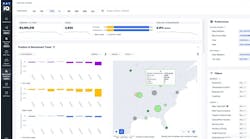The Federal Motor Carrier Safety Administration’s (FMCSA) proposal to mandate electronic onboard recorders for motor carriers that violate hours-of-service rules has elicited a broad range of reactions from trucking stakeholders and safety groups.
Among the harshest critics was public-advocacy group Public Citizen, which called the proposed rule “a very weak standard.”
“Instead of mandating onboard recorders in all commercial trucks with a fair, across-the-board standard, FMCSA released a proposed rule that would require recorders only for trucking companies that have been caught significantly violating hours-of-service rules,” said Joan Claybrook, Public Citizen president. “These recorders should be mandated in an across-the-board standard that treats all companies equally.”
Public Citizen is deeply vested in hours-of-service (HOS) reform, since it led a lawsuit against FMCSA that resulted in the U.S. District Court of Appeals for the District of Columbia declaring the 2003 HOS “arbitrary and capricious” for not sufficiently considering its effect on driver health. The Court chided FMCSA for not including EOBRs in the 2003 rule.
The Canadian Trucking Alliance (CTA) has advocated for EOBRs to be mandatory on all trucks, with the choice of technology left to carriers. However, CTA used markedly softer language than Public Citizen.
“Our concern with making EOBRs mandatory only for repeat violators is that it holds those carriers of any size, who are more likely to cross a scale or to have an audit, to a higher standard than others,” said David Bradley, CTA CEO. “The sooner governments provide carriers that are already using EOBRs, or those who would be willing to adopt them, with meaningful incentives, the better will be compliance with hours-of-service rules and the more level the playing field will be for all.”
CTA noted that the EOBR rule “may have a relatively minor impact on Canadian carriers” given that compliance orders would be given “based on HOS violations found during an audit rather than in roadside inspections.”
By contrast with Public Citizen and CTA, the Owner-Operator Independent Drivers Assn. (OOIDA) does not appear to support any mandated installation of EOBRs, criticizing the proposal for being “long on Big Brother.” OOIDA called the rule “a misdirected attempt to deal with the root causes of hours-of-service violations.”
OOIDA said that the rule does nothing to alleviate the work conditions that pressure drivers into violating the rule to begin with: excessive loading and unloading time.
“The real hours issue related to fatigue…[is] the 30 to 40 more hours drivers spend each week on loading and unloading docks that will not be captured by these devices,” OOIDA said.
The Teamsters union has endorsed the rule, but said that it “will continue to negotiate language in future contracts that prevent the abuse of data collected by EOBRs.” Specifically, Teamsters is concerned that data used in any electronic tracking system could be used as grounds for disciplinary action against its members.
Perhaps the strongest backer of the FMCSA proposal was the American Trucking Assns., which said the rule was “a sensible approach to the greater implementation of technology designed to improve safety and document driver compliance with work and rest rules.”
“We support this incentive-based approach to the use of electronic onboard recorders,” said ATA president & CEO Gov. Bill Graves.
To comment on this article, write to Terrence Nguyen at [email protected]


